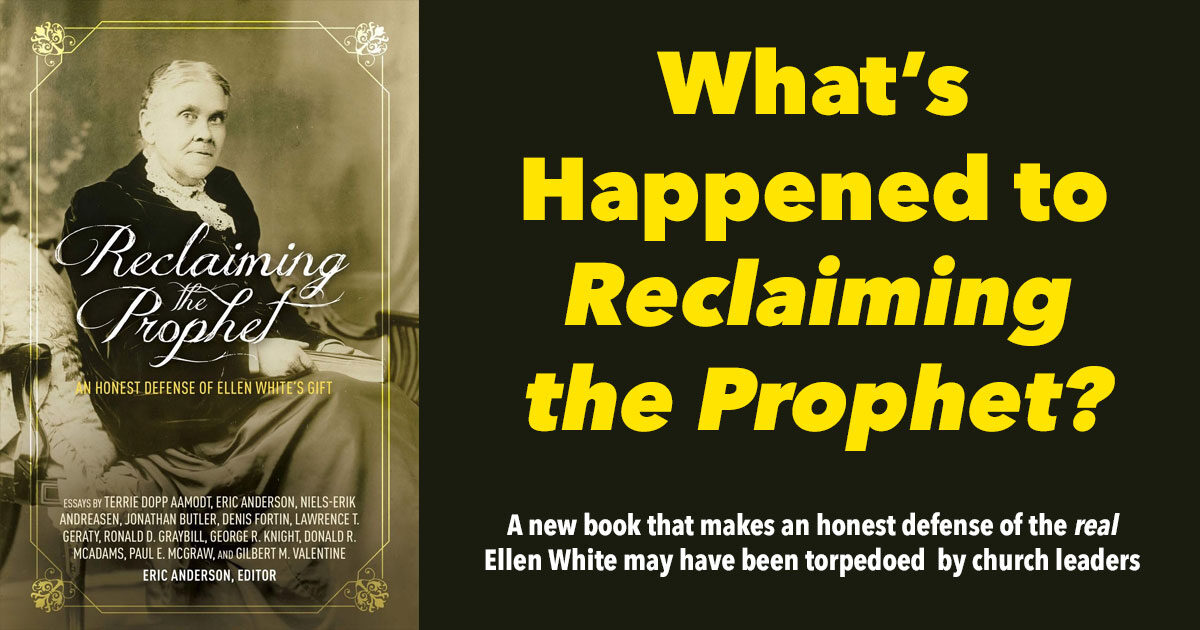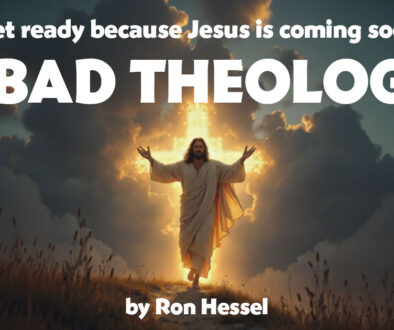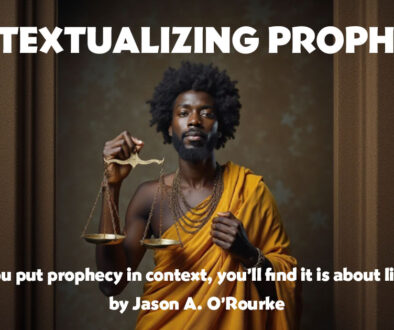Has a New Book on Ellen White Been Deep-Sixed?
by Loren Seibold | 12 June 2025 |
Recently we read a rumor that a new book about Ellen White, published by Pacific Press, had been withdrawn from the market. A far-right Adventist website was the first to say that Reclaiming the Prophet had been pulled from both the shelves and the presses. Amazon lists it as “currently unavailable.”
Last week a statement released by the White Estate concluded with,
“Following recent consultations, Pacific Press has decided not to further circulate or reprint the book. We are grateful for these actions and appreciate their ministry as a dedicated and loyal church publishing house.”
What is Reclaiming the Prophet—and will you ever get to see it?
Reclaiming the Prophet
Reclaiming the Prophet was the fruit of a conference of Ellen White scholars and historians who met at Pacific Union College in October of 2023. They began with what the book’s editor, Eric Anderson, called a “shared hunch… that the Seventh-day Adventist denomination faces a turning point” and that “it was time to move from demolition of false ideas to recognizing true ones.”
That is to say, rather than criticizing Ellen White, these scholars came to her defense—but with a difference: they wanted to defend the real Ellen White, the historical woman, not a mythologized figure.
And that includes great respect for her achievements. Writes Anderson:
“Discussion of Ellen White’s life and achievements has too often been a matter of combat in dense fog, with one side expending its energy capturing imperfections and the other side retreating, inch by inch, under extreme duress. If we are to recover Ellen White as a woman in full, we should begin by reminding ourselves of her achievements.”
These authors weren’t setting out to diminish Ellen White, but to evaluate her contributions in a historical context.
“As her spiritual heirs, we do need to think about what she accomplished. Even with a prophet, it is necessary to stand back, note long-term trends, and grant some credit to human effort. Otherwise, our assessments are likely to be skewed, unbalanced by flaws, or marred by improbable claims.”
In the introduction, Anderson notes “five generalizations that will be supported” in the book:
- “Ellen White led the Advent Movement from ‘fanaticism’ to Christian orthodoxy.
- “Ellen White inspired the creation of a network of schools and medical institutions committed to re-creation and restoration.
- “Ellen White taught her followers to separate holy living from legalism.
- “Ellen White prodded Adventism into a world-wide mission that transcended its American roots.
- “Ellen White quietly rejected exaggerated claims about herself.”
White Estate opposition
A document dated June 5 and signed only “Ellen G. White Estate Board of Trustees” takes serious issue with Reclaiming the Prophet. While acknowledging that the book’s 11 authors “have written from a place of genuine conviction and concern… what we share will be at odds with several of their positions.”
The trustees’ opposition centers on “Ellen White’s understanding of her work as the ‘Lord’s messenger’ and the Seventh-day Adventist doctrinal acceptance of the prophetic gift”—notably “the near absence of attention to special revelation from God for His church through Ellen White’s writings and ministry.”
Specific criticisms of the book include:
- Ellen White is presented as “an inspiring devotional writer” rather than prophet.
- She is shown as human: there is “a shift toward a human-based approach to inspiration.” The authors specifically question these assertions they say are made in the book:
- “Is it really a fact that Ellen White was a ‘plagiarist’?
- “…that her ‘chronic insomnia’ was sometimes interpreted by her as being awakened in the night by an angel?
- “…that Ellen White engaged in a coverup regarding her use of sources?
- “…that Marian Davis should probably be given co-author status with Ellen White?”
- “The book redefines ‘prophet’ as merely ‘a person who (in God’s name) persuades—a leader who changes people’s behavior.’”
- The book is “slanted toward historical-critical scholarship”—for example, the idea “that divine action cannot be evaluated and therefore must be excluded from consideration.”
- It doesn’t draw on church apologetics about Ellen White that “present a biblically and historically defensible understanding of Ellen White’s use of sources, role of her assistants, inspiration, fallibility, and the relationship of her writings to Scripture….”
- They object to a suggestion that references to her “prophetic authority” and Ellen White as an “identifying mark of the remnant church” in Fundamental Belief 18 be removed.
In a summary statement, the authors say that
“What is omitted in the book does more to deconstruct the fundamental nature of the prophetic gift and God’s establishment of the Seventh-day Adventist Church as a remnant movement of Bible prophecy than what has been stated in it. If this book had been written by a group of non-Adventist scholars and published by a non-Adventist press it might be considered an engaging and perhaps sympathetic review of Ellen White from an outside-of-faith perspective.”
The Estate, it appears to me, wants us to hold on to the notion that Ellen White is a plaster saint, whose words and actions are beyond serious reevaluation—and that could mean that Reclaiming the Prophet is gone.
Responding to the White Estate
Jonathan Butler, one of the authors in Reclaiming the Prophet, takes issue with the Estate’s criticisms. Butler wrote to Adventist Today,
“The White Estate response to the book is admittedly very different from Reclaiming the Prophet’s approach to Ellen White. The authors of this book accept the scholarship of the 1970s: that Ellen White borrowed extensively from other authors, and that she was not the last word on science, history, or even the Bible.
“It feels like for the White Estate, the Ellen White scholarship of the 1970s never happened. The Ellen White of the 1950s is alive and well and does not need to be reclaimed, nor do we need a new or fresh understanding of her. But the authors of this volume wrote with the recognition that many church members have become disillusioned with Ellen White. They grew up with her, but they don’t read her writings as they used to, and certainly no longer hang on her every word. In some minds she’s an old woman sitting on a porch down the street, with old-fashioned ideas, who chases them off her lawn when they misbehave.
“The White Estate taught us to think of Ellen White the way we do, and we have done that for over a century. But those days are gone. She is not the same kind of authority she was back then. Reclaiming the Prophet wants to help people think about her in ways which fit our time and place.
“We Adventists owe a great deal to Ellen White. There is no reason to ‘throw mama from the train.’ Without her we would not be who we are in our families, our careers, our musical tastes, our healthful living, or our social lives.
“But we also know that the Ellen White we now live with is different from the Ellen White we grew up with. We’re trying to understand and appreciate her. The White Estate needs to understand her too.”
What will happen to Reclaiming the Prophet?
Unless had already purchased Reclaiming the Prophet, I’m not sure if you’ll get another chance. Although some copies are already in the hands of readers, the White Estate statement seems quite certain that since the Adventist censor librorum have withdrawn their official nihil obstat, the book will no longer be sold.
Eric Anderson, the book’s editor, continues to defend the volume as an honest and fair defense of Ellen White. He told Adventist Today,
“I am amazed how a hastily organized conference led to a very successful meeting in 2023. Even more remarkable is the way that a book emerged in only eighteen months. With unusual unanimity, eleven senior scholars agreed that our denomination faces a crisis—and offered a coherent, constructive way out. And then the most important Adventist publisher created an accessible book for a general audience. Speaking as a believer, I’d say that God was at work in the creation of Reclaiming the Prophet.”
I’m hoping, as are the book’s authors, that this important document will again be available to Adventist readers—and from one of the church’s official publishing firms. Wait and see.
 Loren Seibold is a retired pastor, and the Executive Editor of Adventist Today.
Loren Seibold is a retired pastor, and the Executive Editor of Adventist Today.




